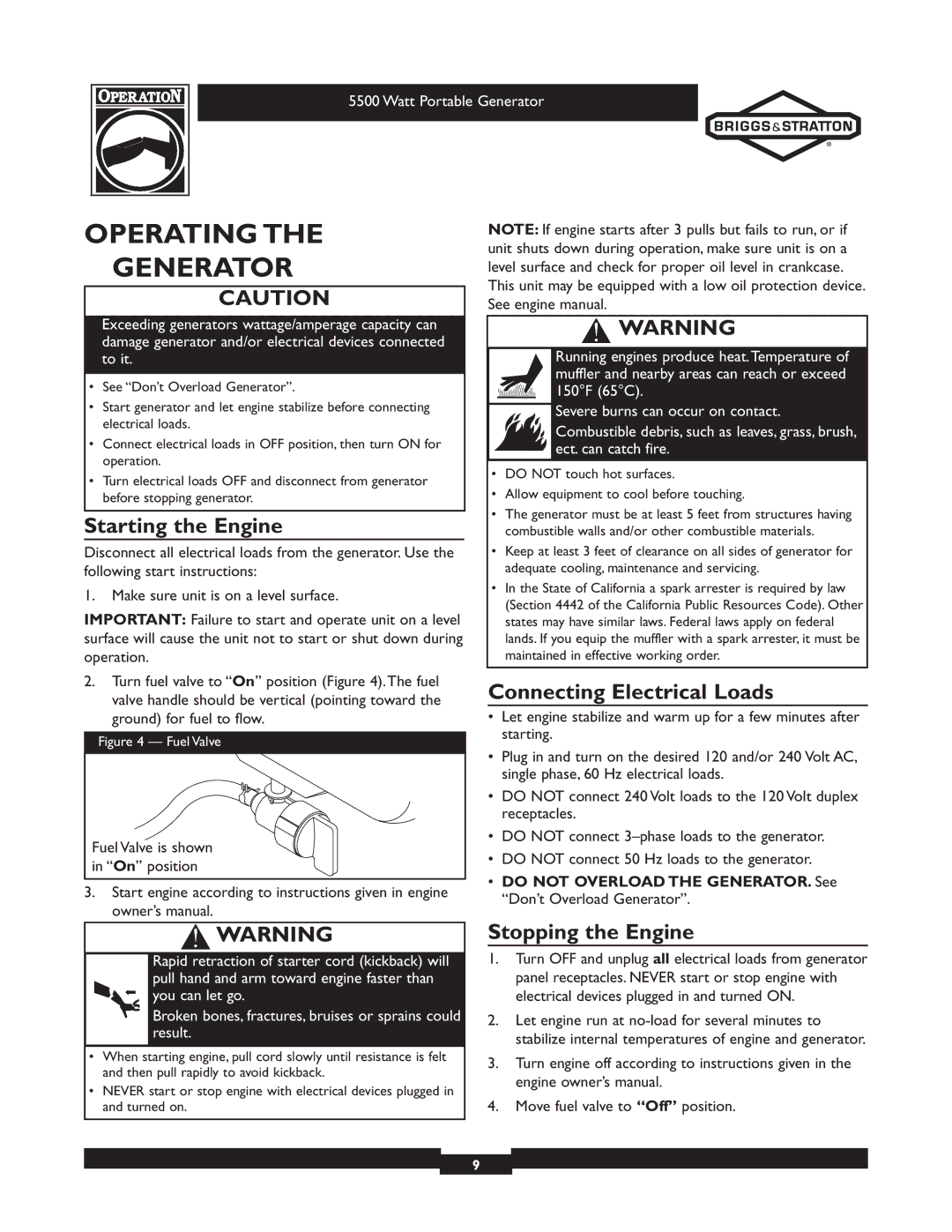
5500 Watt Portable Generator
OPERATING THE
GENERATOR
CAUTION
Exceeding generators wattage/amperage capacity can damage generator and/or electrical devices connected to it.
•See “Don’t Overload Generator”.
•Start generator and let engine stabilize before connecting electrical loads.
•Connect electrical loads in OFF position, then turn ON for operation.
•Turn electrical loads OFF and disconnect from generator before stopping generator.
Starting the Engine
Disconnect all electrical loads from the generator. Use the following start instructions:
1.Make sure unit is on a level surface.
IMPORTANT: Failure to start and operate unit on a level surface will cause the unit not to start or shut down during operation.
2.Turn fuel valve to “On” position (Figure 4).The fuel valve handle should be vertical (pointing toward the ground) for fuel to flow.
Figure 4 — Fuel Valve
Fuel Valve is shown in “On” position
3.Start engine according to instructions given in engine owner’s manual.
NOTE: If engine starts after 3 pulls but fails to run, or if unit shuts down during operation, make sure unit is on a level surface and check for proper oil level in crankcase.
This unit may be equipped with a low oil protection device. See engine manual.
![]() WARNING
WARNING
Running engines produce heat.Temperature of muffler and nearby areas can reach or exceed 150°F (65°C).
Severe burns can occur on contact.
Combustible debris, such as leaves, grass, brush, ect. can catch fire.
•DO NOT touch hot surfaces.
•Allow equipment to cool before touching.
•The generator must be at least 5 feet from structures having combustible walls and/or other combustible materials.
•Keep at least 3 feet of clearance on all sides of generator for adequate cooling, maintenance and servicing.
•In the State of California a spark arrester is required by law (Section 4442 of the California Public Resources Code). Other states may have similar laws. Federal laws apply on federal lands. If you equip the muffler with a spark arrester, it must be maintained in effective working order.
Connecting Electrical Loads
•Let engine stabilize and warm up for a few minutes after starting.
•Plug in and turn on the desired 120 and/or 240 Volt AC, single phase, 60 Hz electrical loads.
•DO NOT connect 240 Volt loads to the 120 Volt duplex receptacles.
•DO NOT connect
•DO NOT connect 50 Hz loads to the generator.
•DO NOT OVERLOAD THE GENERATOR. See “Don’t Overload Generator”.
![]() WARNING
WARNING
Rapid retraction of starter cord (kickback) will pull hand and arm toward engine faster than you can let go.
Broken bones, fractures, bruises or sprains could result.
•When starting engine, pull cord slowly until resistance is felt and then pull rapidly to avoid kickback.
•NEVER start or stop engine with electrical devices plugged in and turned on.
Stopping the Engine
1.Turn OFF and unplug all electrical loads from generator panel receptacles. NEVER start or stop engine with electrical devices plugged in and turned ON.
2.Let engine run at
3.Turn engine off according to instructions given in the engine owner’s manual.
4.Move fuel valve to “Off” position.
9
